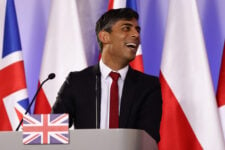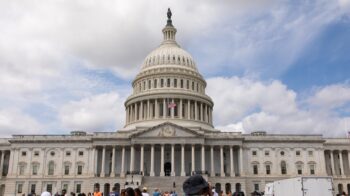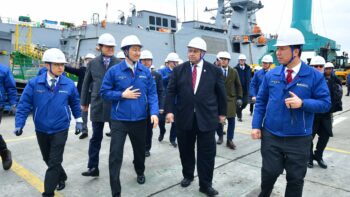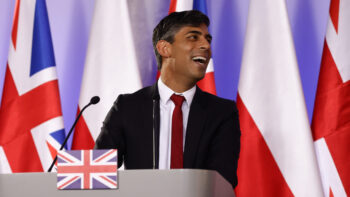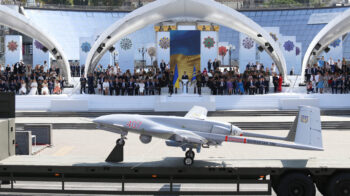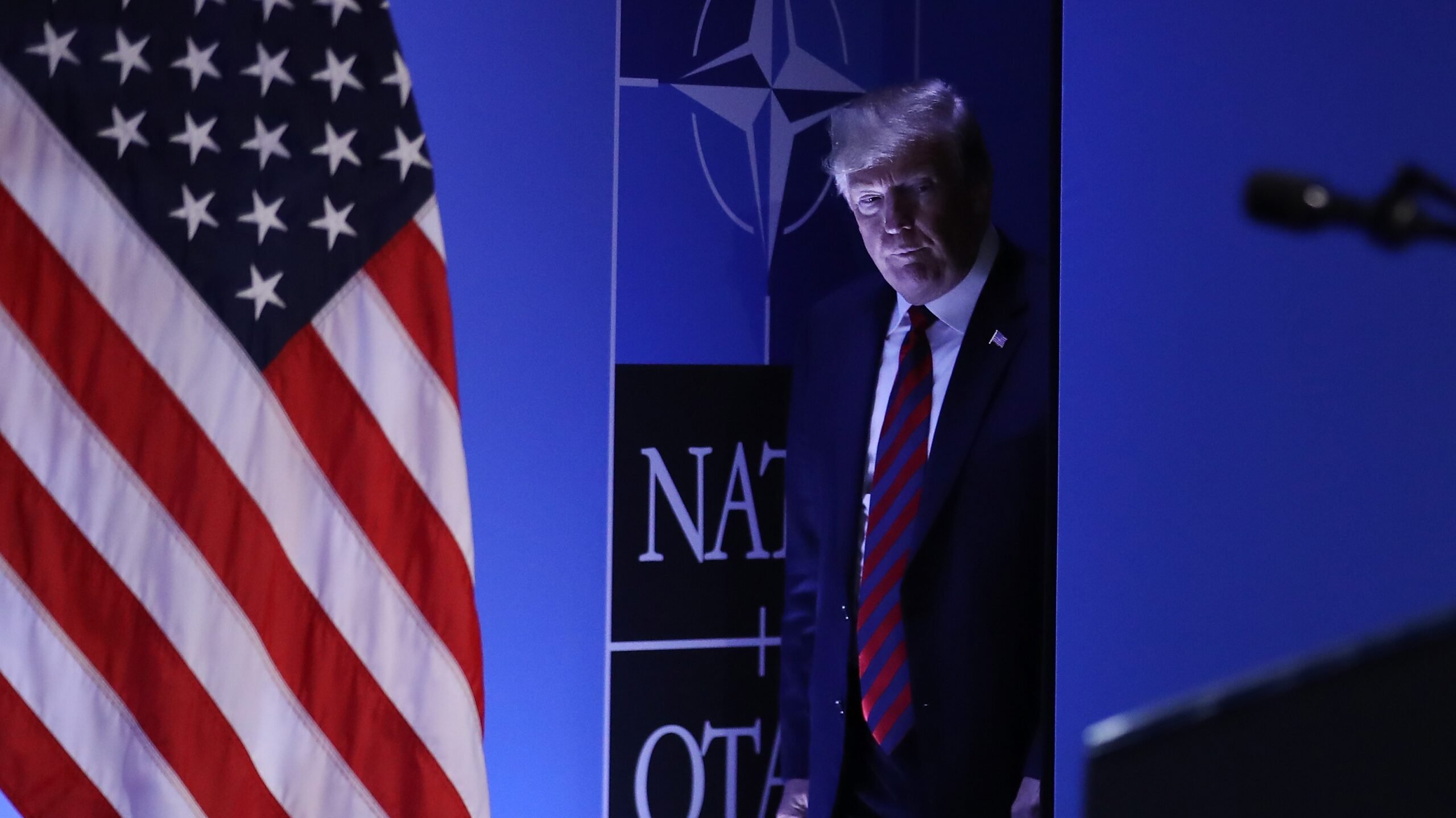
Then-President Donald Trump arrives to speak to the media at a press conference on the second day of the 2018 NATO Summit on July 12, 2018 in Brussels, Belgium. (Sean Gallup/Getty Images)
With an active Russian invasion on its doorstep and Finland and Sweden asking to join, NATO seems more relevant than at any point since the fall of the Berlin Wall. But, former counterterrorism official Eric Robinson warns the following op-ed, alliance leaders need to keep a wary eye on the looming danger that is American politics.
It is a moment of triumph for NATO. The alliance’s main threat, the Russian military, suffered decisive defeats in the battles for Kyiv and Kharkiv in Ukraine. Furthermore, as a direct result of Russia’s invasion, both Sweden and Finland have petitioned NATO for membership. Not since the Berlin Wall fell has a component of the United States’ commitment to Europe’s security been so clearly validated.
Regrettably, this remarkable state of affairs in Europe obscures the alliance’s true fragility — a vulnerability so pronounced that NATO’s current confidence could soon become a historic footnote. Internal disputes are not new to NATO, of course. Charles de Gaulle withdrew French military forces from NATO’s high command, Greece and Turkey are effectively rivals, and there is a substantial disparity in defense spending among members. These challenges pale in comparison, however, to NATO’s most critical vulnerability: American politics.
In 1947, Sen. Arthur Vandenberg established a baseline for American political alignment when he stated that “politics stops at the water’s edge,” that partisan differences should be minimized in matters of national security. Republicans and Democrats alike would certainly vary in their approaches, but challenging the Soviet Union provided a degree of predictability to American foreign policy. This partisan harmony continued beyond the Cold War, extending into bipartisan support for the Persian Gulf War and the invasion of Iraq. Then came Donald Trump, and an open hostility to America’s longstanding international practices.
As a candidate, Trump articulated a deep skepticism of America’s international obligations and his arguments resonated with voters who had soured on the foreign policy establishment. His version of “America First” echoed the original America First Committee of the 1930s and 1940s: disdainful of international commitments, comfortable with authoritarian systems, and accepting moral compromises as a cost of doing business in a rough world.
RELATED: NATO nations should invest more on air defense, fires, EUCOM nominee says
During his time in office, Trump did not shift his views on limiting America’s international obligations, but he never truly acted on his intuition, either. NATO remained shaken yet intact, his administration amended NAFTA with Canada and Mexico, and his team helped establish official relationships between Israel and a series of once-hostile countries. However, since Trump’s exit from office, reporting indicates that he expressed interest or actively explored going further, including wanting to withdraw military forces from Europe and end the US military commitment to the Republic of Korea, two pillars of America’s global security commitment. And notably, Trump’s former national security advisor John Bolton has specifically said he believed Trump would seek to leave NATO.
The popularity of “America First” politics returns us to NATO’s critical vulnerability. If he decides to run again, Trump seems almost assured to be the GOP’s nominee for president in 2024. Recent primaries and patterns of behavior among Republicans currently in the House and Senate have shown that Trump’s hold on the GOP may not be ironclad, but he remains the leading party figure. Should Trump return to the White House, he would likely do so with a Republican House and Senate far less likely to push back on his foreign policy than during his first term in office — and as a president who will assuredly be inclined to listen to his close supporters encouraging his basest instincts.
What this means internationally is that NATO members must begin planning for both “America-light” (the US stays involved but in a dramatically reduced role) and “America-free” (the US effectively leaves NATO) variants of the alliance. It is unlikely that the Senate would approve an official withdrawal from the North Atlantic Treaty, but the president enjoys vast Commander in Chief authorities, and a mere “We are not going to station forces here, we are not training with you, and we will never fight for you” could be enough to effectively unravel the American presence in the alliance. From a pure risk management standpoint, NATO must ensure it can stand on its own regardless of who is in the White House from here on out.
First, to reduce the likelihood of a withdrawal, NATO countries should meet their defense spending obligations, or 2% of respective GDPs (prior to the Ukraine War, only a few member states did this). It is both a military imperative and smart international politics to invest in defense and meet this obligation. Furthermore, if Trump has a “win” under his belt, he may be less outwardly hostile towards the alliance — look at how NATO Secretary General Jens Stoltenberg made a point of praising Trump for pushing allies to spend more as a way of holding relations between the White House and Brussels together.
RELATED: What Finland will bring to NATO – and how it might change the alliance
Second, NATO countries should examine what the US provides the alliance and adjust priorities accordingly. No NATO member matches US military capability, but NATO does not have the same international commitments, so certain systems — like aircraft carriers or long-range cargo aircraft — do not need to be replicated. However, airborne warning and control, signals intelligence, airborne refueling capacity, secure communications architecture, offensive cyber capacity, anti-submarine warfare platforms, and brigade- and division-sized combined arms forces should be revitalized. Simply stated, if a NATO planner has ever assumed “the US will probably handle this” in evaluating a future crisis scenario, a fallback plan should be developed.
Third, and most importantly, NATO should embrace the uncertainty of “America-light” and “America-free” variants of the alliance by becoming robust and ensuring resilience against a variety of potential crises. NATO’s weapons systems have been battle proven in Ukraine, but there are limits to European weapons stocks and production capacity. In short, NATO member countries should be spending as much as they can on anti-armor missiles and rockets, unmanned aircraft, surface to air missiles, spare parts, and artillery and small-arms munitions so, if there’s a crisis in an “America-light” or “America-free” future, NATO can continue the fight alone.
“America-light” and “America-free” scenarios are not science fiction and NATO cannot treat them accordingly. It is also important to acknowledge that preparing for these scenarios is going to be politically sensitive, given just how vital the American military is to the current version of the alliance.
No one knows what will happen between now and 2024. But regardless of any individual election outcome, or the current Congress’ willingness to provide military aid to Ukraine, the “America First” movement has taken root in America, and that means ties to NATO or any ally or partner cannot be taken for granted. Accordingly, any assumption that America will simply fill any military gaps in Europe is no longer tenable.
If NATO is serious about collective defense through the rest of the 21st century, member states need to not only plan against a Russian threat, but also for an American retreat.
Eric Robinson is an attorney who previously served as a civilian at the Joint Special Operations Command and the National Counterterrorism Center. He fought in Iraq and Afghanistan with the 101st Airborne Division. The contents of this article are his alone and do not reflect the views of any past or current employer. He is active on Twitter @UticaEric.
Senate passes $95 billion foreign aid bill, as DoD eyes next Ukraine weapons package
Additional aid for Ukraine could be made available “within days” said Pentagon Press Secretary Maj. Gen. Pat Ryder earlier today.

